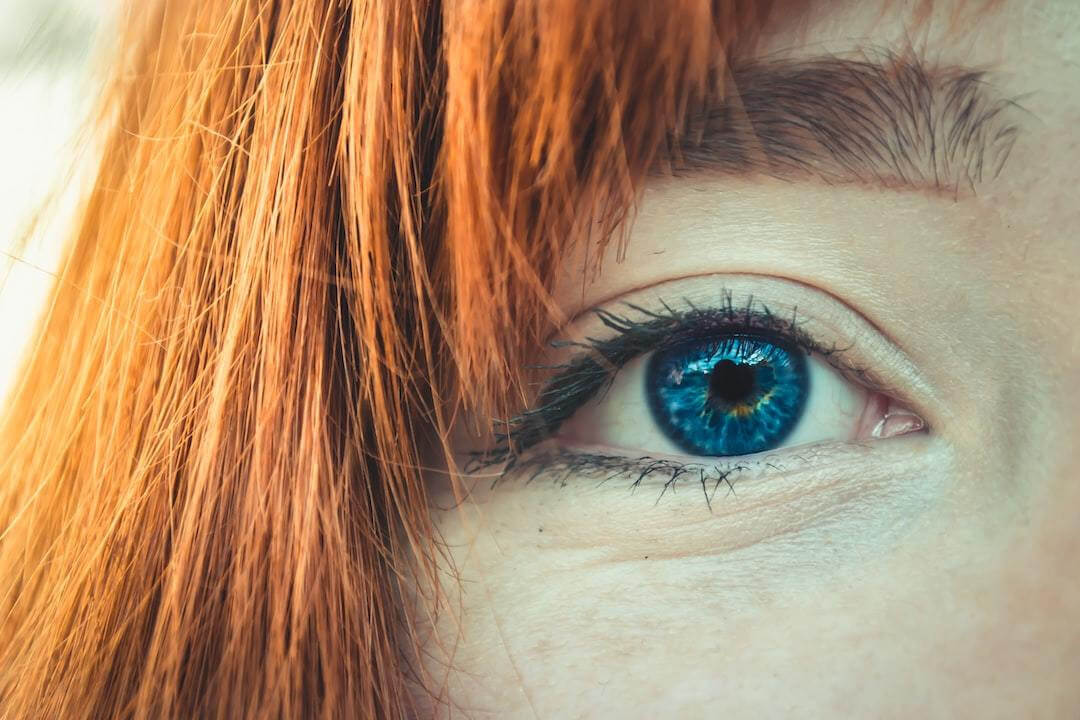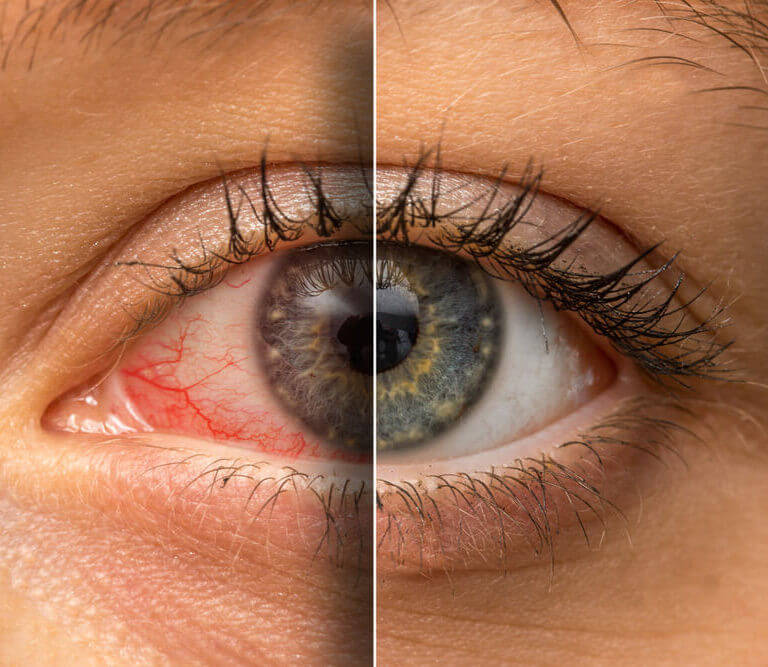Are blue eyes more sensitive to light? This question has been a topic of interest among eye health professionals and the general public alike. It's important to understand that eye color, specifically lighter-colored eyes like blue or green, can indeed influence sensitivity to bright light and harmful UV rays.
In this comprehensive guide, we'll find out 'are blue eyes more sensitive to light?' and go deeper into the causes behind this heightened sensitivity in individuals with blue eyes. We'll also discuss the common symptoms associated with increased light sensitivity, how it is diagnosed by an eye doctor during an eye exam, and available treatment options.
You'll learn about preventive measures for maintaining optimal eye health despite sun exposure. An intriguing connection between light eyes and sneezing will be explored as well. Lastly, we'll shed some light on macular degeneration related to UV radiation and why people with blue eyes should consider wearing sunglasses more often.
Table of Contents:
- Causes of Blue Eye Sensitivity
- Symptoms of Blue Eye Sensitivity
- Diagnosing Blue Eye Sensitivity
- Treatment for Blue Eye Sensitivity
- Preventing Blue Eye Sensitivity
- Light Eyes and Sneezing
- Sun Exposure and Macular Degeneration
- Sun's Out, Shades On.
- Conclusion
Causes of Blue Eye Sensitivity
Given the reduced amount of melanin in blue eyes, it is recommended that those with this eye color invest in some shades for protection against sun damage. If you possess a pair of blue eyes, it is advisable to consider wearing sunglasses.
Genetics Play a Role
A gene called OCA2 determines how much melanin we produce, which affects eye color and sensitivity to light. You can attribute your heightened sensitivity to genetics - thanks, mom and dad.
Melanin Matters
Studies show that people with less melanin may experience discomfort or pain when exposed to bright lights. So, if you're squinting in the sun, it's not just you.
Pigment Dispersion Syndrome
Light-eyed individuals are at higher risk for Pigment Dispersion Syndrome, which can increase sensitivity to light even further. So, if you have blue eyes and are extra sensitive, it might be worth getting checked out.
Symptoms of Blue Eye Sensitivity
Blue-eyed folks, beware. Bright illumination can be an uncomfortable experience for blue-eyed individuals. Literally. Due to the lack of melanin in their irises, people with blue eyes are more sensitive to light, a condition known as photophobia.
What are the symptoms?
Well, for starters, squinting or closing your eyes in bright light is a common one. It's like your eyes are saying, "Nope, not today, sun."
- Frequent headaches: Bright lights can trigger migraines or tension-type headaches in some people. Ouch.
- Tearing up: Your eyes might start to water excessively, making it hard to see. It's like your eyes are crying for help.
And if you have albinism or keratoconus, you're even more susceptible to these symptoms. If you're having difficulty seeing clearly, it's time to seek medical advice. They can examine your eyes and suggest treatments to help you cope with your sensitivity.
Diagnosing Blue Eye Sensitivity
Got blue eyes and light sensitivity? Don't turn a blind eye to it. Get a proper diagnosis from an eye care professional. They'll help determine the cause of your symptoms and suggest appropriate treatments.
The first step in diagnosing blue eye sensitivity is usually a comprehensive eye exam. This may include tests like:
- Visual acuity test: Measures how well you see at various distances.
- Pupil dilation: Examines parts of the eye more thoroughly by dilating your pupils with special drops.
- Tonometry: Measures pressure inside the eye, which can be higher if there's inflammation or other issues causing light sensitivity.
To further assess the cause of light sensitivity, a doctor may recommend additional tests such as pupil dilation and tonometry to rule out conditions like macular degeneration, glaucoma or cataracts.
The doctor will also take into account any relevant medical history, medications, and family health issues that could be contributing to the condition. The doctor will want to know about any past or present health problems, medications you're taking (as some drugs can increase photosensitivity), and whether there's a family history of similar symptoms or diseases affecting vision.
People with lighter-colored eyes might need specific tests because their lack of pigmentation makes them susceptible to certain conditions not typically seen in those with darker eyes.
Don't delay - speak to your eye doctor to ensure your vision remains healthy. Seek advice from an optometrist who specializes in light-sensitive conditions. It could make all the difference between maintaining good vision and suffering preventable damage.
Treatment for Blue Eye Sensitivity
If your baby blues are feeling sensitive, don't fret. There are plenty of ways to manage this condition. First, consult with an ophthalmologist to get personalized guidance.
Eye Drops:
Over-the-counter eye drops can help reduce light sensitivity by constricting the pupil. It's a quick fix for those bright days.
Sunglasses:
Rocking shades that block 100% of UV rays can protect your eyes from harmful sunlight. Polarized lenses are especially effective at minimizing reflected light that causes squinting.
Contact Lenses:
Tinted contact lenses can block out certain light wavelengths, helping those with delicate eyes bear intense conditions.
If these treatments don't provide enough relief, prescription medications or surgery may be recommended. But always discuss potential risks and benefits with a qualified medical professional.
Don't ignore persistent light sensitivity - it could lead to more serious vision problems down the line. Seek early intervention to keep those baby blues healthy.
Preventing Blue Eye Sensitivity
More like sensitive eyes. Here are some tips to protect those baby blues:
Avoid Direct Sunlight
UV rays are bad. Shade is good. Hat with a wide brim is better.
Wear Sunglasses
Block 100% of UV rays with sunglasses. Say goodbye to glare and hello to eye protection.
Maintain Good Eye Health
Vitamins A and C are eye-friendly. Regular check-ups are eye-necessary.
Use Appropriate Lighting Indoors
Fluorescent lights and blue light = eye discomfort. LED lights or natural lighting from windows = eye happiness.
Remember, self-care is great, but if you're experiencing persistent discomfort or vision changes, consult an ophthalmologist. Don't be shy, they've seen it all.
Can Brown Eyes Handle Light Better?
When it comes to light sensitivity, the color of your eyes can play a significant role. People with lighter-coloured eyes, particularly those with blue eyes, tend to be more sensitive to bright light and UV radiation than their brown-eyed counterparts.
The Science Behind Eye Colours
Your eye colour is determined by the amount and type of pigments in your eye's iris, as well as how the iris scatters light. Blue eyes have less melanin—a pigment that protects against sun damage—than brown or green eyes. As a result, they may be more susceptible to damage from harmful UV rays.
Sensitivity To Light And Blue Eyes
Studies show that people with blue or other light-coloured eyes are generally more sensitive to sunlight due to their lack of protective pigmentation. This doesn't just mean discomfort in direct sunlight—it could also lead to an increased risk for certain types of macular degeneration over time if proper precautions aren't taken.
6. Light Eyes and Sneezing
Why do some people sneeze in the sun? It's called the photic sneeze reflex, and it's more common in people with light-colored eyes. This reflex happens when the optic nerve and trigeminal nerve cross-communicate, causing a sneeze.
Why Are Blue Eyes More Sensitive to Light?
- Sensitivity to light: Blue eyes have less melanin, making them more sensitive to light. This sensitivity can trigger the optic nerve and lead to sun-induced sneezing.
- Inherited trait: This reflex is often passed down through families, indicating its genetic nature.
- Rapid adjustment: Moving quickly from dim lighting to bright sunlight can cause pupils to dilate rapidly, triggering a quick series of one or two sudden uncontrollable bursts -sneezes.
If you're one of the 18% to 35% of people who experience this reflex, don't worry it's generally harmless. However, if it becomes bothersome or interferes with your daily activities, consider seeking medical advice. While there isn't a specific treatment for photic sneeze reflex, wearing sunglasses may help reduce its frequency by minimizing exposure to intense light.
Research continues to explore links between eye color and susceptibility to conditions related to brightness levels. Stay tuned for updates.
Sun Exposure and Macular Degeneration
Too much sun can be bad for your eyes, especially if you have blue eyes. Excessive sunlight can lead to macular degeneration, a common cause of vision loss in older adults which results from the breakdown of the central part of the retina called the macula. This condition occurs when the central part of your retina, called the macula, starts to break down.
People with lighter eye colors, like blue or green, have less melanin in their irises. Melanin helps protect your eyes from harmful UV rays, so those with less melanin are at a higher risk for macular degeneration.
The Connection Between Sunlight and Macular Degeneration
Studies have shown that too much sun exposure can increase your chances of developing macular degeneration. According to a report by JAMA Ophthalmology, there is a significant link between high levels of sun exposure and age-related macular degeneration.
Risks for Those with Blue Eyes
If you have blue eyes, it's important to be aware of the risks and take steps to protect your eyes when you're outside. Wearing sunglasses that block 100% of UVA and UVB rays can help shield your retinas from damage caused by the sun's ultraviolet light.
Tips for Protecting Your Eyes from the Sun
- Avoid Direct Sun Exposure: Never look directly at the sun, even during an eclipse, without proper protective eyewear.
- Eat a Healthy Diet: Foods rich in antioxidants, like leafy greens, can help protect against eye diseases, including age-related macular degeneration.
- Wear a Hat: A wide-brimmed hat can provide additional protection for your eyes and face.
Sun's Out, Shades On.
For those of you with lighter-coloured eyes it's time to shield them from the bright light. Lighter eyes mean more sensitivity to uv light and the sun's harmful rays, but fear not - sunglasses are here to save the day.
Style and Protection
When picking out shades, make sure they're not just a pretty face. Search for eyewear that blocks the full range of UVA and UVB radiation to safeguard your vision. Polarized lenses are also a great choice to reduce glare and make outdoor activities more enjoyable.
Color Me Protected
Choosing the right tint can make all the difference. Amber lenses increase contrast and reduce glare, perfect for sports enthusiasts. Gray lenses provide true color perception, making them ideal for driving.
Remember, any sun protection is better than none at all. So grab your favorite pair and rock those shades like the blue-eyed boss you are.
Conclusion
Do blue eyes get more sunburned? Yes, blue eyes are more sensitive to UV radiation and can get sunburned more easily than darker eyes due to the lack of melanin in the iris.
Protect your peepers by wearing sunglasses with UV protection and avoiding direct sunlight during peak hours.
Why did the scarecrow win an award? Because he was outstanding in his field.
But seriously, regular eye check-ups are important to maintain healthy vision and catch any potential issues early on.
Why don't scientists trust atoms? Because they make up everything.
But in all seriousness, taking care of your eyes by practicing good hygiene and protecting them from harmful UV rays is crucial for long-term eye health.



.jpg)



